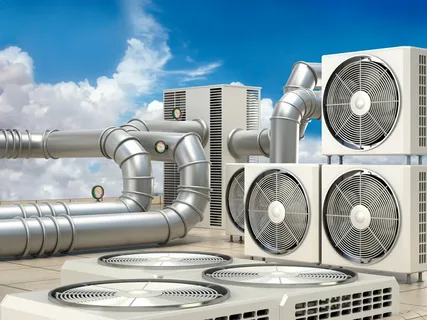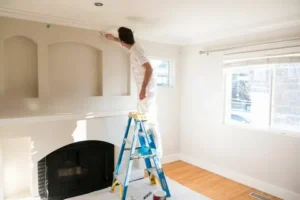When did you last take a deep breath and truly appreciate the air around you? In today’s fast-paced world, we often overlook one of our most vital resources—air. The quality of indoor air can significantly impact not just your comfort but also your health. Poor Air Ventilation can lead to hidden dangers lurking in your home, from allergens to unwanted moisture. Imagine walking into a space that feels stale or musty; it’s not only uninviting but could pose severe risks over time.
The Hidden Dangers of Poor Indoor Air Quality
Poor indoor air quality can be a silent threat, often unnoticed until it affects your health. Common culprits include dust mites, pet dander, and volatile organic compounds (VOCs) emitted from household products. These pollutants can trigger allergies, asthma attacks, and other respiratory issues.
In addition to allergens, inadequate ventilation can lead to moisture accumulation. This creates an environment ripe for mould growth, damaging your home and posing severe health risks. Breathing in mould spores can result in chronic sinus problems or even lung infections.
The effects of poor indoor air quality extend beyond physical discomfort; they impact your mental well-being, too. Studies have shown that stale air contributes to fatigue and decreased concentration levels. A healthy living space fosters clarity and energy—something everyone deserves!
Adequate Ventilation: A Key to Comfort and Well-Being
Adequate Air-Ventilation is essential for maintaining a comfortable living environment. Good airflow helps regulate temperature, ensuring your home remains cozy in winter and cool during summer months. This balance contributes significantly to your overall comfort.
Moreover, proper ventilation plays a crucial role in promoting well-being. It reduces the concentration of indoor pollutants like dust, allergens, and volatile organic compounds (VOCs). By circulating fresh air throughout your space, you create an atmosphere that’s pleasant and healthy.
When you prioritize effective ventilation in your home, you’re investing in a better quality of life. Improved air circulation enhances mood and productivity while reducing stress levels. A well-ventilated space fosters physical health and emotional stability—essential components of true well-being.
How Proper Ventilation Reduces Allergens in Your Home
Proper ventilation plays a crucial role in maintaining a healthy indoor environment. It circulates fresh air, diluting and removing allergens such as dust mites, pet dander, and pollen that can accumulate over time. When stale air lingers, these irritants thrive, making it difficult for occupants to breathe comfortably.
By ensuring consistent airflow throughout your home, you reduce the concentration of airborne particles. This is especially important in areas like bedrooms and living spaces where people spend considerable time. Improved air quality can significantly alleviate allergy symptoms.
Additionally, adequate ventilation systems filter out pollutants before they enter your home. Investing in high-efficiency particulate air (HEPA) filters or upgrading existing systems can further enhance the removal of harmful allergens from your living space. Cleaner air leads to happier and healthier inhabitants.
The Role of Air-Ventilation in Preventing Mold and Mildew
Mold and mildew thrive in damp, poorly ventilated spaces. Without adequate Air-Ventilation, moisture accumulates on surfaces, creating an ideal environment for these unwanted guests. When humidity levels rise, spores can spread rapidly, leading to potential health risks and property damage.
Adequate Air-Ventilation helps regulate indoor humidity by circulating fresh air throughout your home. This constant airflow reduces moisture accumulation and removes stale air that may contain mould spores or other allergens. A well-ventilated space is less likely to become a breeding ground for mould.
Regularly checking and maintaining your ventilation system is essential for preventing mould growth. Simple actions like opening windows or using exhaust fans can make a significant difference in keeping your living areas dry and healthy. Prioritizing proper ventilation protects your home’s structure and the well-being of its inhabitants.
Breathe Fresh: The Benefits of Natural Ventilation in Your Home
Natural ventilation uses outdoor air to improve indoor air quality and provide a comfortable living environment. Here are the key benefits of incorporating natural ventilation into your home:
Improved Air Quality
Natural ventilation helps remove indoor air pollutants, such as dust, smoke, and volatile organic compounds (VOCs), by allowing fresh outdoor air to flow through the home. This promotes a healthier living environment.
Energy Efficiency
Natural ventilation relies on fresh air rather than mechanical systems like air conditioning or fans. It reduces the need for energy-intensive cooling and heating, which can lower utility bills and reduce one’s carbon footprint.
Temperature Control
Strategic placement of windows, vents, and openings can help regulate indoor temperature. Cross-ventilation allows cooler air to enter from one side of the house while warmer air exits from the other, creating a comfortable temperature without artificial cooling.
Noise Reduction
Natural ventilation can help reduce noise levels inside your home, especially when using quiet, passive airflows. This can create a more peaceful environment than mechanical systems that may generate noise.
Air Ventilation Solutions for Small Spaces: Tips for Maximum Airflow
Maximizing airflow in small spaces can be challenging, but effective strategies to improve Air Ventilation exist. Start by keeping windows open whenever possible. Even short bursts of fresh air can make a significant difference.
Use fans strategically to enhance circulation. Position them near windows or doorways to create cross-ventilation, drawing in outdoor air while pushing stale indoor air out. Ceiling fans work wonders, too; ensure they rotate counterclockwise for a cooling effect during warmer months.
Consider using exhaust fans in kitchens and bathrooms. They help remove moisture and odours quickly, crucial for maintaining good indoor air quality. Adding plants also contributes positively; certain varieties can naturally filter the air and boost oxygen levels without taking up much space.
Why Ventilation is Essential for Modern, Energy-Efficient Homes
Modern energy-efficient homes are designed to be tightly sealed, maximizing insulation and minimizing heat loss. However, this can inadvertently trap pollutants and stale air inside. Proper ventilation is vital for maintaining a healthy indoor environment while reaping energy efficiency benefits.
With suitable Air-Ventilation systems, you can ensure fresh outdoor air circulates throughout your home. This circulation helps reduce excess moisture and removes harmful contaminants that could affect your family’s health.
Additionally, adequate ventilation works alongside your heating and cooling systems to enhance performance. By balancing airflow, you maintain comfortable temperatures year-round without overworking HVAC units or increasing utility bills. Proper Air-Ventilation protects your health and your home’s energy efficiency.
Improving Sleep Quality Through Better Home Ventilation
Air quality plays a crucial role in sleep quality. When your home has poor ventilation, it can trap allergens and pollutants that disrupt your rest. Breathing in stale air can lead to discomfort and disturbances during the night.
Adequate airflow helps regulate temperature and humidity levels, creating an optimal sleeping environment. Fresh air lowers carbon dioxide levels, improving oxygen flow to your brain while you sleep. This ensures that you wake up feeling refreshed instead of groggy.
Incorporating effective ventilation methods like opening windows or using exhaust fans can significantly enhance the atmosphere of your bedroom. Consider adding plants known for purifying air to boost indoor freshness further. A well-ventilated space promotes deeper sleep cycles, allowing for restorative rest every night.
How Effective Ventilation Protects Your Home from Structural Damage
Adequate Air-Ventilation is crucial for preventing structural damage in your home. Moisture can accumulate in hidden areas like attics and basements without proper airflow. This damp environment fosters conditions that lead to wood rot and decay and even compromise the integrity of your home’s foundation.
Excess humidity can weaken building materials over time. Walls become susceptible to cracking, while ceilings may sag under the weight of trapped moisture. Ignoring these issues not only affects aesthetics but also poses safety risks.
Additionally, poor ventilation contributes to pest infestations as insects thrive in humid environments. By ensuring adequate airflow throughout your living space, you safeguard both the structure and longevity of your home. Regular maintenance checks on vents will help keep everything running smoothly and protect against costly repairs.
The Connection Between Ventilation and Energy Efficiency
Proper Air-Ventilation is crucial for maintaining energy efficiency in your home. When fresh air circulates effectively, it helps regulate indoor temperatures. This minimizes reliance on heating and cooling systems, lowering utility bills.
Inadequate ventilation can trap heat and humidity indoors, forcing HVAC systems to work harder than necessary. This not only increases energy consumption but also shortens the lifespan of your equipment. By improving airflow, you enhance system performance while reducing wear and tear.
Furthermore, a well-ventilated space allows for better moisture control. Excess humidity can lead to mould growth and structural damage over time, which requires costly repairs. Adequate Air-Ventilation promotes energy savings while protecting your home from potential hazards.
Cleaner Air, Better Health: Ventilation’s Role in Reducing Indoor Pollutants
Indoor pollutants can come from various sources, including furniture, cleaning products, and outdoor air. Without proper Air-Ventilation, these harmful substances accumulate over time. This buildup not only affects the quality of your air but also poses risks to your health.
Adequate ventilation helps disperse these contaminants and brings in fresh air. By continuously exchanging stale indoor air with clean outdoor air, you effectively dilute harmful particles that could trigger allergies or respiratory issues.
Moreover, good ventilation maintains optimal humidity levels in your home. High humidity can lead to mould growth and other allergens that worsen indoor pollution.
Top Signs Your Home Needs Better Ventilation
If you notice persistent odours lingering in your home, it’s a clear sign that Air-Ventilation is lacking. Stale smells can come from cooking, pets, or mould hiding in corners. Fresh air keeps those odours at bay.
Another warning sign is condensation on windows and walls. Excess moisture indicates poor airflow, which can lead to more significant issues like mould growth over time. If your surfaces are frequently damp or feel clammy, it’s time to assess your ventilation system.
Frequent allergy flare-ups among household members can also signal inadequate ventilation. Dust mites and pollen thrive in stagnant air, potentially worsening respiratory conditions. Improved airflow brings cleaner air into your space while pushing out allergens for better health.
Conclusion
Prioritizing air ventilation in your home can significantly enhance your overall quality of life. With proper airflow, you create a space that is comfortable and healthy for you and your loved ones. Good air circulation helps to minimize indoor pollutants, allergens, and moisture levels, fostering an environment conducive to well-being. The benefits extend beyond comfort; they touch every aspect of daily living. Investing in effective ventilation systems or strategies will improve health and energy efficiency.
FAQs
What are common signs my home has poor ventilation?
Signs include musty odours, condensation on windows, excessive dust buildup, and frequent allergies or respiratory issues among occupants.
How often should I ventilate my home?
Aim to ventilate your living space daily by opening windows when weather permits or using mechanical systems designed for continuous airflow.
Can natural Air Ventilation be enough in all climates?
While natural Air Ventilation works wonders in temperate climates, extreme weather conditions may require a combination of mechanical solutions for optimal comfort and air quality.




